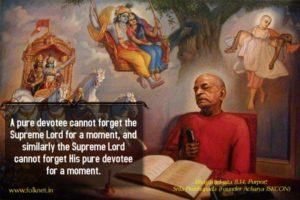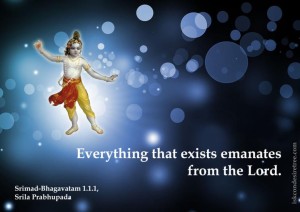Hare Krishna dear devotees,
Please accept my humble obeisances.
All glories to Srila Prabhupada.
Position of demigods
Sometime we have confusion on the position of demigods. We also observe that Vaishnavas, especially Gaudiya vaishnavas, do not worship demigods whereas the spiritual master and acharya are worshiped thrice a day! Is it mere sentimentalism or is there a solid philosophy behind it. Srimad Bhagavatam answers this question in the below verse, as to whose shelter devotees should seek, and it’s very instructive purport on the position of demigods.
sarvato manaso ’saṅgam ādau saṅgaṁ ca sādhuṣu
dayāṁ maitrīṁ praśrayaṁ ca bhūteṣv addhā yathocitam
A sincere disciple should learn to dissociate the mind from everything material and positively cultivate association with his spiritual master and other saintly devotees. He should be merciful to those in an inferior position to him, cultivate friendship with those on an equal level and meekly serve those in a higher spiritual position. Thus he should learn to deal properly with all living beings.
High position of demigods
Śrīla Madhvācārya has quoted from the Garuḍa Purāṇa to demonstrate that within this universe those who take birth as demigods, great ṛṣis or pious human beings are all considered santaḥ, or saintly persons. According to Bhagavad-gītā, traiguṇya-viṣayā vedāḥ: the varṇāśrama culture described in Vedic literature deals mostly with the living entities who are struggling within the three modes of nature. The Vedic literatures teach such conditioned souls that material happiness can be achieved only through pious works. In this sense, the demigods are to be considered the most pious living entities within the three modes of material nature. The ṛṣis, or the great saintly mystics of the universe, who are able to travel at will to various planets and who cultivate mystic powers, are to be considered somewhat below the demigods. And those human beings on earth who perfectly execute the Vedic rituals are to be considered in the third or lowest category of santaḥ, or saintly persons.
Pure devotees transcends the material modes
But a devotee of the Lord is beyond the three modes of material nature. Lord Krishna says in Bhagavad-gītā (14.26):
māṁ ca yo ’vyabhicāreṇa bhakti-yogena sevate
sa guṇān samatītyaitān brahma-bhūyāya kalpate
“One who engages in full devotional service, who does not fall down in any circumstance, at once transcends the modes of material nature and thus comes to the level of Brahman.” Thus Lord Krishna clearly says that a Vaiṣṇava who does not fall down from the regulations of bhakti-yoga is beyond the three modes of nature. And Lord Krishna advised Arjuna, a Krishna-bhakta, to transcend the three material qualities of the illusory creation of māyā (nistraiguṇyo bhavārjuna).
What about demigods?
In the Eighteenth Chapter of Bhagavad-gītā (18.40) the Lord says:
na tad asti pṛthivyāṁ vā divi deveṣu vā punaḥ
sattvaṁ prakṛti-jair muktaṁ yad ebhiḥ syāt tribhir guṇaiḥ
“There is no being existing, either here or among the demigods in the higher planetary systems, who is free from the three modes of material nature.” Thus the demigods are not exempt from the pollution of the three modes of material nature, whereas a pure devotee actually becomes guṇātīta, or transcendental to the influence of māyā.
Conclusion
Therefore, one should cultivate the association of the uttama-adhikārī, or pure devotee of the Lord, as stated previously (Bhāg. 11.3.21):
tasmād guruṁ prapadyeta jijñāsuḥ śreya uttamam
śābde pare ca niṣṇātaṁ brahmaṇy upaśamāśrayam
“Therefore any person who seriously desires real happiness must seek a bona fide spiritual master and take shelter of him by initiation. The qualification of the bona fide guru is that he has realized the conclusions of the scriptures by deliberation and is able to convince others of these conclusions. Such great personalities, who have taken shelter of the Supreme Godhead, leaving aside all material considerations, should be understood to be bona fide spiritual masters.”…
One cannot be liberated without association with a pure devotee of the Lord.
All glories to Sri Guru and Gauranga.
All glories to Srila Prabhupada.
your servant,
Giriraj dasa
P.S. Please read the full purport at SB 11.3.23


